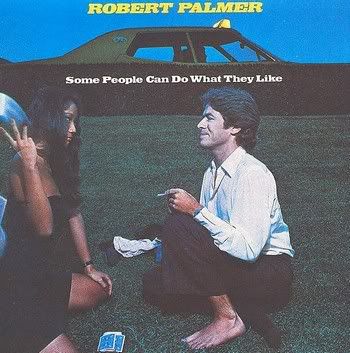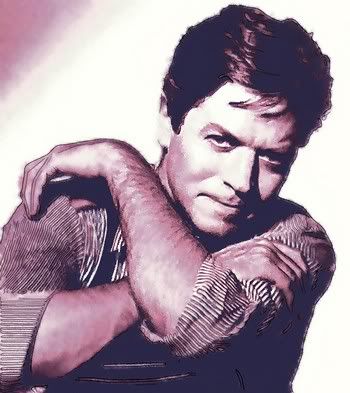
Robert Palmer - Some People Can Do What They Like - 1976 - Island
Out of print in the U.S.! From his solo debut in the mid '70s to his death three decades later, Robert Palmer was one of Rock's finest vocalists, with each performance filled with soul, power and emotion. His undying musical creativity ensured that each of his albums would retain his signature sound, yet would be a successful step in a different direction. He was truly a Rock chameleon, as this album proves. Originally released in 1976, Some People... features 10 tracks including 'One Last Look', 'Man Smart (Woman Smarter)' and 'Keep In Touch'. © 1996-2009, Amazon.com
"Some People Can Do What They Like" is one of the late Robert Palmer's most underrated albums. It is a great blue-eyed soul album with some great rock, reggae, and funk elements. Musicians include the great Little Feat members, Paul Barrere, and Bill Payne. Continuing the Little Feat connection, the late Lowell George's "Spanish Moon" is covered here, brilliantly. The late great drummer Jeff Porcaro is another player on this album, as is the brilliant bassist, Chuck Rainey. An overlooked album, as Robert Palmer is mainly remembered for his great eighties albums like "Pride", and "Heavy Nova". Listen to Robert Palmer's "Woke Up Laughing", and "Riptide" albums, and check out some of his earlier work like Vinegar Joe's "Six Star Gypsies" album @ VINJO/6SGYP on which he played with Elkie Brooks, and Keef Hartley.
TRACKS / COMPOSERS
1."One Last Look" (Bill Payne, Fran Tate) – 4:22
2."Keep in Touch" (Robert Palmer) – 3:25
3."Man Smart" (Woman Smarter)" (D. Kleiber) – 2:35
4."Spanish Moon" (Lowell George) – 5:58
5."Have Mercy" (Don Covay) – 3:50
6."Gotta Get a Grip on You, Pt. II" (Robert Palmer, Alan Powell) – 3:57
7."What Can You Bring Me" (James Gadson) – 3:43
8."Hard Head" (John Watson) – 4:30
9."Off the Bone" (Phil Brown, Robert Palmer, S. Smith) – 2:18
10."Some People Can Do What They Like" (Robert Palmer) – 4:09
MUSICIANS
Robert Palmer - vocals
Freddie Wall, Carol Kaye, Freddie Harris - guitar
Paul Barrere - guitar, background vocals
Pierre Brock, Chuck Rainey - bass
William D. "Smitty" Smith, James Allen Smith - keyboards
Bill Payne - keyboards, background vocals
Michael "Spider" Webb, Jeff Porcaro, Richard Hayward - drums
Sam Clayton - percussion, background vocals
Jody Linscott - percussion, Conductor
Robert Greenidge - steel drums & pans
Chilli Charles - timbales
Greg Carroll - harmonica
Arthur Smith - ocarina, penny whistle
REVIEW
Robert Palmer's third album is a blue-eyed soul disc that sits comfortably alongside Sneakin' Sally Through the Alley and Pressure Drop. This time, Palmer drops the orchestrations that tarted up portions of Pressure Drop in favor of a stripped-down yet stylish sound that shows off his ability to create a romantic, soulful mood. Highlights include "One Last Look," a lush breakup ballad that features a catchy, harmony-drenched chorus, and "Keep in Touch," a romantic tune that highlights Palmer's vocal style at its seductive height over a jazzy yet mellow melody built on a complex background vocal arrangement. Another standout track is "Man Smart, Woman Smarter," a tongue-in-cheek look at the battle between the sexes that deftly blends pop melodicism with reggae rhythms. The downside of Some People Can Do What They Like is that it often favors mood over hooks and this leads to music that is listenable yet falls short of being truly compelling: funky mood pieces like "What Can You Bring Me" and "Hard Head" successfully evoke a sultry mood but never take that mood in an interesting melodic direction. Another problem track is "Off the Bone," an effects-drenched instrumental snippet that serves no purpose other than to fill up two minutes of the album's running time. Despite these occasional lapses, Some People Can Do What They Like remains a solid and likable outing with enough memorable moments to please anyone who enjoys blue-eyed soul at its most silky and elegant. © Donald A. Guarisco, allmusic.com

BIO (Wikipedia)
Robert Allen Palmer (January 19, 1949 - September 26, 2003), born in Batley, Yorkshire, England, was a British singer. He was known for his soulful voice and the eclectic mix of musical styles on his albums, combining soul, jazz, rock, blues, and even yodelling. The son of a British serviceman stationed in Malta, Palmer moved with his family to Scarborough, Yorkshire in 1959. Influenced as a child by blues, soul, and jazz music on American Forces Radio, Robert Palmer joined his first band, Mandrake Paddle Steamer, at the age of 15 while still an art student at Scarborough Technical College. His first major break came with the departure of singer Jess Roden from the band The Alan Bown Set in 1969, after which Palmer was invited to London to sing on their single "Gypsy Girl". The vocals for the album The Alan Bown!, originally recorded by Roden (and released in the US that way), were re-recorded by Palmer after the success of the single. In 1970, Palmer joined the 12-piece jazz-rock fusion band Dada, which featured singer Elkie Brooks. The band lasted a year, after which Brooks and Palmer formed the critically acclaimed but commercially unsuccessful rhythm and blues group, Vinegar Joe; Palmer sang and played rhythm guitar. Signed to the Island Records label, they released three albums: Vinegar Joe (1972), Rock 'n' Roll Gypsies (1972), and Six Star General (1973). On the basis of his youthful looks, strong stage presence, and soulful voice, Island Records signed Palmer to a solo deal. His first solo album Sneakin' Sally Through the Alley recorded in New Orleans, Louisiana in 1974, was heavily influenced by the music of Little Feat and the funk fusion of The Meters who acted as backing band along with producer/guitarist Lowell George of Little Feat. His first single was a cover of Little Feat's "Sailin' Shoes". Although moderately successful in the UK, both the album and single reached the Top 100 in the US. Subsequently relocating from London to New York City with his wife, Palmer released Pressure Drop in 1976 (featuring famed Motown bassist James Jamerson). An album infused with his interests in reggae and rock music, it was noted for its cover art of a nude girl on a balcony rather than any commercially successful songs. He toured with Little Feat to promote that album. However, with the failure of the follow-up Some People Can Do What They Like, Palmer decided to move to the Bahamas; after that, his "expatriate lifestyle" was likely to receive more coverage than his music in British newspapers. In 1978, he released Double Fun, a collection of Caribbean-influenced rock, which reached the Top 50 on the US Billboard magazine charts and scored a Top 20 single with the Andy Fraser-penned "Every Kinda People". Palmer's next album was an artistic departure, concentrating on a rockier direction. Secrets produced his second Top 20 single with Moon Martin's "Bad Case of Loving You (Doctor, Doctor)". The 1980s saw Palmer reach the peak of his commercial success. The album Clues, produced by Gary Numan, generated hits on both sides of the Atlantic, first with the radio-friendly single "Johnny and Mary" and then "Looking for Clues". Catchy videos matching the synth pop stylings of New Wave gave him much needed exposure to a younger audience. The success was repeated with the 1982 EP release of Some Guys Have All the Luck. In 1985, Palmer joined drummer Tony Thompson and Duran Duran guitarist Andy Taylor and bass player John Taylor to form the band Power Station. Their eponymous album reached the Top 20 in the UK and the US and spawned two hit singles with "Some Like It Hot" and the T. Rex cover "Get It On". (The video of "Some Like It Hot" featured model Caroline Cossey.) Palmer performed live with the band only once that year, on Saturday Night Live; the band toured with singer Michael Des Barres when Palmer bowed out at the last moment to go back into the studio to further his newly revitalized solo career. Palmer recorded the album Riptide (1986), which featured the Number 1 single "Addicted to Love". The single was accompanied by a memorable and much parodied music video, directed by Terence Donovan, in which Palmer is surrounded by a bevy of near-identically clad, heavily made-up female "musicians". The singles "Hyperactive" and "I Didn't Mean to Turn You On" also performed well. In 1987, he won the Grammy Award for Best Male Rock Vocal Performance for his song "Addicted to Love". Palmer was approached by Little Feat to replace Lowell George as they prepared their 1987 reunion, but had to decline for contractual reasons. In 1987, Palmer moved to Lugano, Switzerland and set up his own recording studio. Producing Heavy Nova in 1988, Palmer again returned to experimenting, this time with bossa nova rhythms, heavy rock, and white soul balladeering. He repeated his previous success with "Addicted to Love" with the video of "Simply Irresistible", again Palmer with a troupe of female "musicians". The ballad "She Makes My Day" also proved to be a hit. In 1989, he won a second Grammy for "Simply Irresistible". Rolling Stone magazine voted Palmer the best-dressed rock star for 1990. Palmer collaborated with UB40 for his next album, Don't Explain. Released in 1990, it featured the Bob Dylan-penned Top 10 single "I'll Be Your Baby Tonight" and the Top 20 "Mercy Mercy Me". Throughout the 1990s, Palmer ventured further into diverse material. The 1992 album Ridin' High was a tribute to the Tin Pan Alley era. In 1995, Palmer reunited with other members of The Power Station to record a second album. Bassist John Taylor eventually backed out of the project (due to personal problems), to be replaced by Chic member Bernard Edwards. Palmer and the rest of the band completed the album Living In Fear (released in 1996), and had just begun touring when Edwards died of pneumonia. The next few years saw more touring and more compilations; the next release of new material, Rhythm and Blues (1999) contained a mixture of Little Feat influenced songs, rock, and pop. His final release, Drive (2003), was critically hailed as his grittiest and most heartfelt album of his career. Inspired by a previous collaboration with Carl Carlton on a Robert Johnson tribute album, Drive featured covers of fifteen blues standards, plus the original track "Lucky". Palmer, who made his home in Lugano, Switzerland for the past 15 years, died in Paris France of a heart attack at the age of 54. He is interred at the cemetery in Lugano.





2 comments:
LINK
p/w aoofc
LINK
p/w aoofc
Post a Comment